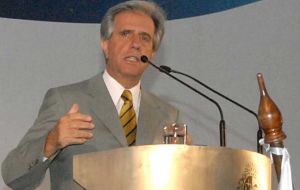MercoPress. South Atlantic News Agency
Vazquez disgusted with disarray quits Socialist Party
 Pte Vazquez felt he was being ingnored by his own party
Pte Vazquez felt he was being ingnored by his own party Uruguay's president Tabaré Vazquez decision to quit the Socialist Party sent shockwaves inside the ruling coalition. The news only became public this week although the letter was dated November 24 a day after the Socialist party rejected a presidential veto on a bill to decriminalize abortion.
The Socialist party chairman Eduardo Fernandez admitted that Vazquez's resignation came as a shock: "I have a long friendship with him, not only personal but also political". When a party members quits it's serious, "but when we're talking of the President, it's a blow", said Fernandez. President Vazquez decision to quit the party comes when the ruling Broad Front is undergoing its most serious internal upheaval in the last ten years, particularly because of the open dispute between presidential hopefuls for 2009 and the continuous disregard for presidential instructions in Parliament. This happens only two days before a caucus of the ruling coalition which has to decide on a short list of presidential hopefuls that will be formally presented to the coalition's congress on December 13/14. Vazquez announcement stunned all wings of the Socialist party that is split between pragmatists (the president's supporters) and orthodoxs, but both sides are hopeful they can meet with the president and request he reviews his decision to quit the party. According to sources close to Vazquez the president felt he was "being ignored, left aside", particularly because of the staunch support for the vetoed abortion decriminalization bill from the Socialist party and the fact Socialists also became involved in the presidential candidacy controversy. Vazquez has been reiterating for months that the coalition's presidential ticket for 2009 should be made up of former Economy minister Danilo Astori and Jose Mujica, but the latter, who has the most votes and belongs to the most voted group in the coalition, insists he should head the ticket. More over the controversy spilt over to the Socialists that, contrary to Vazquez's wishes, promoted the name of Industry minister Daniel Martínez as another hopeful. Vazquez, together with a group of doctors, joined the Socialist party in 1983, during the military regime when politics were banned, but with the return of democracy to Uruguay in 1984, he rapidly climbed and was elected to the Central committee. In 1989 he was nominated candidate for mayor of the capital Montevideo, which the catch-all broad coalition has held since. But this is not the first time Vazquez appeals to his resignation: in 1997 as president of the Broad Front he left the post when some Montevideo councillors disobeyed his orders and voted against a proposal presented by the coalition. Most groups from the coalition have expressed concern over the Socialist dispute and have offered to mediate. The Communist party on the other hand publicly expressed it was a problem to be decided only by the Socialists. With only a few days for the Congress that should decide on the ruling coalition's 2009 presidential ticket where a two thirds majority is needed, and Mr. Mujica has a winning mathematical chance, the Communists apparently have sided with him on the promise he would sponsor a communist candidate for mayor of Montevideo.




Top Comments
Disclaimer & comment rulesCommenting for this story is now closed.
If you have a Facebook account, become a fan and comment on our Facebook Page!